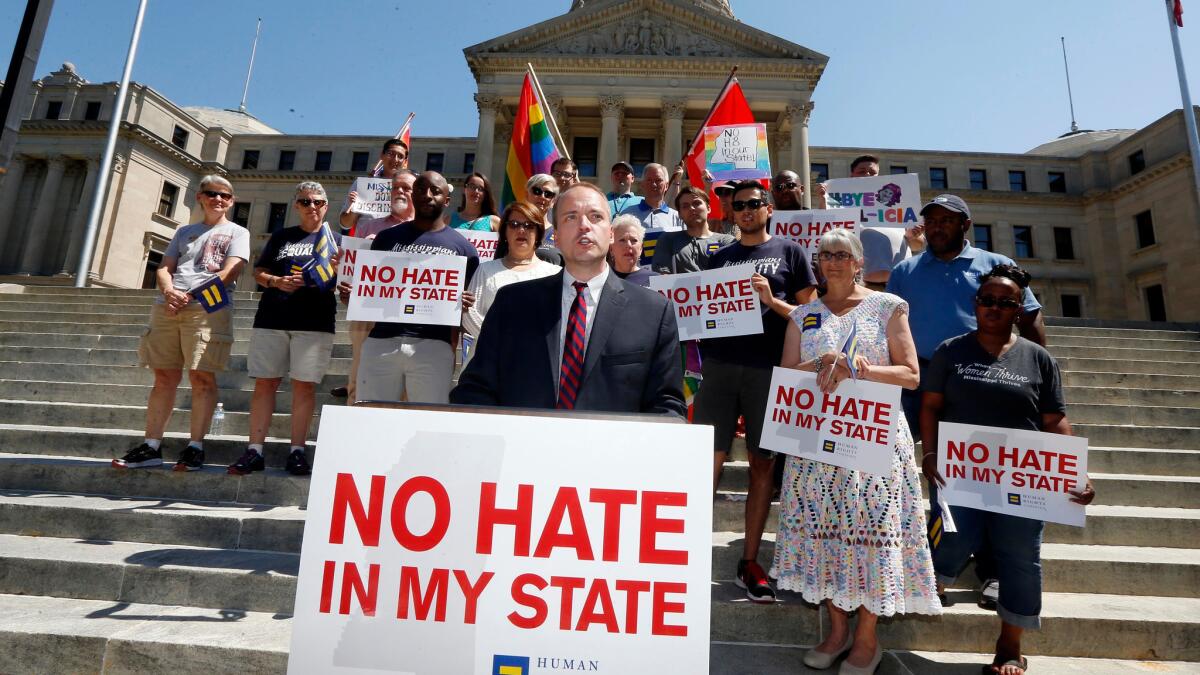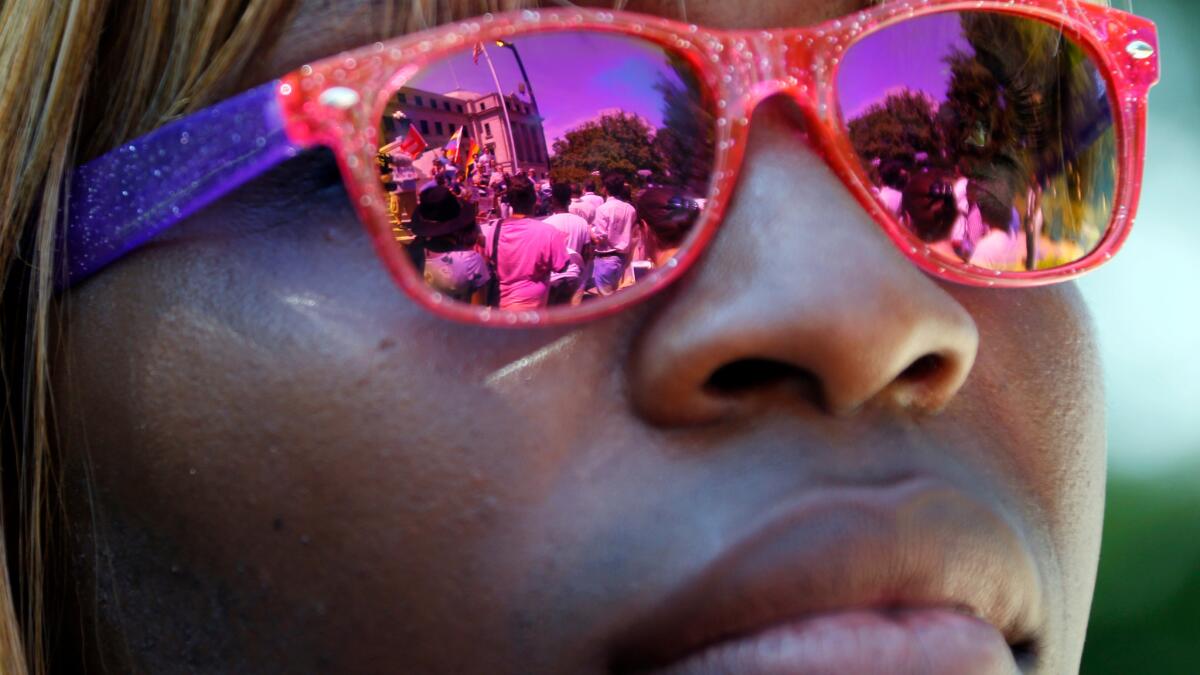Judge blocks Mississippi law on objections to same-sex marriage

- Share via
Reporting from Atlanta — A contentious Mississippi “religious freedom” law that would allow government workers and businesses to deny services to same-sex couples has been blocked by a federal judge.
Less than an hour before HB 1523 was due to go into effect Friday morning, U.S. District Judge Carlton W. Reeves issued a preliminary injunction, arguing the law “violates both the guarantee of religious neutrality and the promise of equal protection of the laws.”
“Persons who hold contrary religious beliefs are unprotected,” he wrote in his 60-page ruling. “The state has put its thumb on the scale to favor some religious beliefs over others.”
The law, signed by Gov. Phil Bryant in April in response to the U.S. Supreme Court’s landmark 2015 ruling that legalized same-sex marriage nationwide, would have allowed government employees to refuse to issue marriage licenses or perform marriage ceremonies. It also permitted businesses and faith-based groups to deny housing, jobs and adoption and foster-care services to people based on their sexual orientation.

Opponents of the law were jubilant. “WE WON!!!” tweeted Brandiilyne Mangum-Dear, the minister of the Joshua Generation Metropolitan Community Church in Hattiesburg and one of the plaintiffs who challenged the law.
“The passage of this bill signaled to our church, and to my wife and me, that our religious beliefs are less worthy of protection than those of others, and that the rights of gay, lesbian, and transgender people are not equal to the rights of others,” Mangum-Dear said in a statement.
“The federal court’s decision recognizes that religious freedom can be preserved along with equal rights for all people regardless of race, religion, or sexual orientation,” Robert McDuff, a Jackson attorney who argued for the plaintiffs, said in a statement. “It is now time for all of us, as Mississippians, to move beyond division and come together in the ongoing pursuit of a society that respects the rights of everyone.”
Matt McTighe, executive director of Freedom for All Americans, a lesbian and gay advocacy group, hailed the decision as “a historic moment for LGBT Mississippians and Americans across the nation.”
Yet Bryant, a firm supporter of the law, said he looked forward to an “aggressive appeal.”
“The law simply provides religious accommodations granted by many other states and federal law,” he said in a statement. “I am disappointed Judge Reeves did not recognize that reality.”
The law’s author, Philip Gunn, the Republican speaker of Mississippi’s House, also expressed dismay. “We felt like this was a good bill that focused on protecting religious beliefs, while also protecting the rights of the LGBT community.”
In the wake of last year’s U.S. Supreme Court decision in Obergefell vs. Hodges legalizing same-sex marriage, state legislatures across the nation, and in particular the Southeast, have debated a range of measures to protect those with religious objections. LGBT advocacy groups have cited Mississippi’s “Protecting Freedom of Conscience from Government Discrimination Act” as the most extensive and far-reaching “religious freedom” measure.
Attorneys for the state argued that HB 1523 provided reasonable accommodations for people with deeply held religious beliefs. The law sought to provide protections to people, religious organizations or private groups who hold a “sincerely-held religious belief” or “moral conviction” that marriage is the union of one man and one woman, that sexual relations should take place only inside such marriages, and that the terms “male” or “female” refer to individuals’ “immutable biological sex.”
Reeves, however, noted that Mississippi residents already have “substantial religious rights” under existing state law. He also pushed back against the law’s narrow framing of religious beliefs. “If three specific beliefs are ‘protected by this act,’ it follows that every other religious belief a citizen holds is not protected by the act,” he wrote. “HB 1523 favors Southern Baptist over Unitarian doctrine, Catholic over Episcopalian doctrine, and Orthodox Judaism over Reform Judaism doctrine, to list just a few examples.”
The Mississippi law allowed physicians and other medical professionals to “decline to participate in the provision” of sex reassignment procedures, psychological counseling or fertility services. It also prevented state government from taking discriminatory action against any churches, religious charities and private businesses that decline services to people violating their religious beliefs.
In his ruling, Reeves, an appointee of President Obama who is the second African American federal judge in Mississippi, drew a link between the state’s current “angst” on religious freedom and its opposition to desegregation during the civil rights era.
In a footnote, he noted that Bryant’s statement that the Supreme Court ruling usurped states’ right to self-governance “sounded familiar,” likening it to Gov. James P. Coleman’s comment in the 1950s that Brown vs. Board of Education represented “an unwarranted invasion of the rights and powers of the states.”
He also took pains to question Mississippi lawmakers’ inconsistency in upholding specific biblical edicts over others, peppering his ruling with quotes from the King James version of the Bible.
“It is not within our tradition to respect one clerk’s religious objection to issuing a same-sex marriage license, but refuse another clerk’s religious objection to issuing a marriage license to a formerly divorced person,” he noted, quoting Leviticus 21:14: “A widow, or a divorced woman, or profane, or an harlot, these shall he not take.”
Ultimately, Reeves argued, the law represented a blatant attempt by the state to “put LGBT citizens back in their place.”
“In physics, every action has its equal and opposite reaction,” he wrote. “In politics, every action has its predictable overreaction. And now Obergefell has led to HB 1523. The next chapter of this back-and-forth has begun.”
Jarvie is a special correspondent.
ALSO
Pro-Trump super PACs try to raise money — but mostly fail
A proud member of the military as a man, and maybe once again as a woman
Attorney general removes herself from deciding possible charges in Clinton email probe
UPDATES:
11:40 a.m.: This article was updated with staff reporting and additional details.
This article was originally published at 5:25 a.m.
More to Read
Sign up for Essential California
The most important California stories and recommendations in your inbox every morning.
You may occasionally receive promotional content from the Los Angeles Times.














